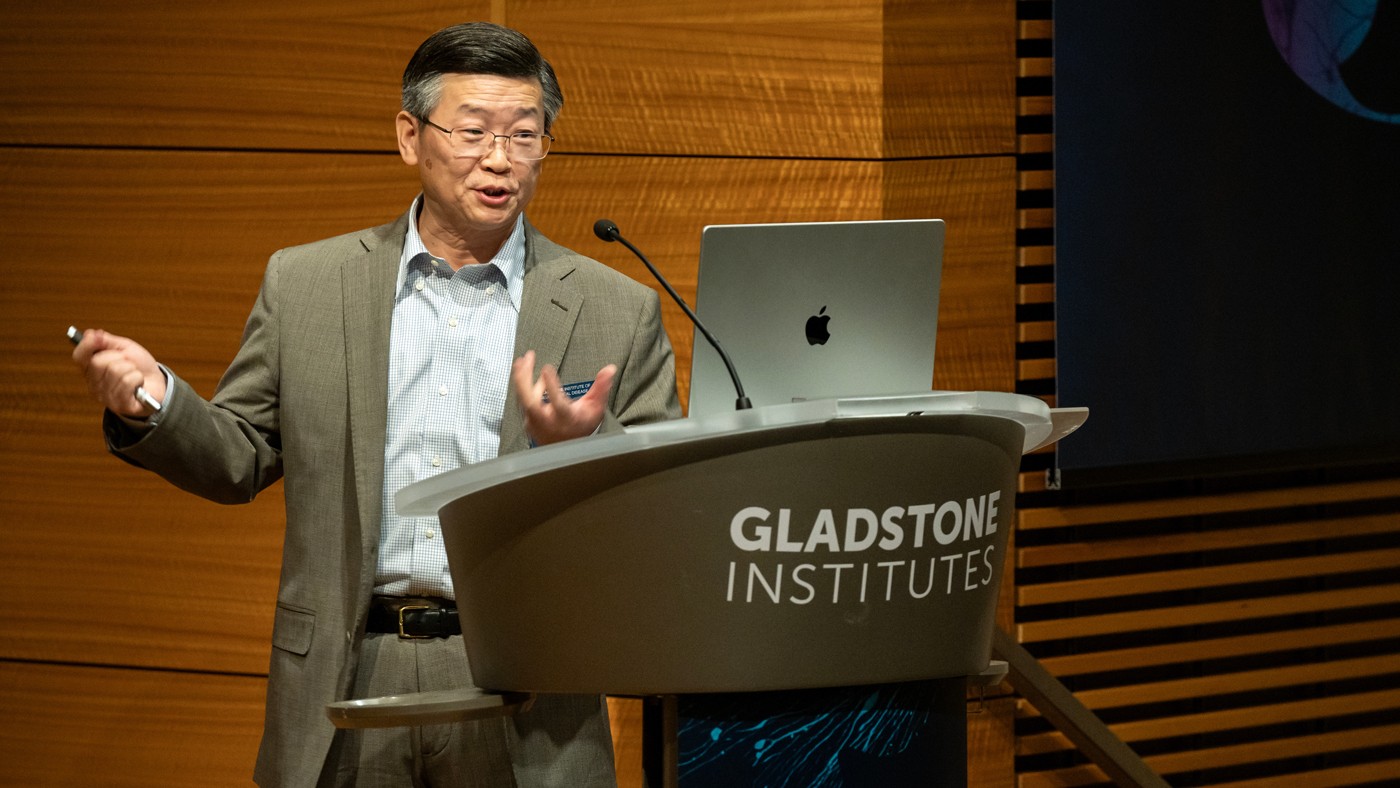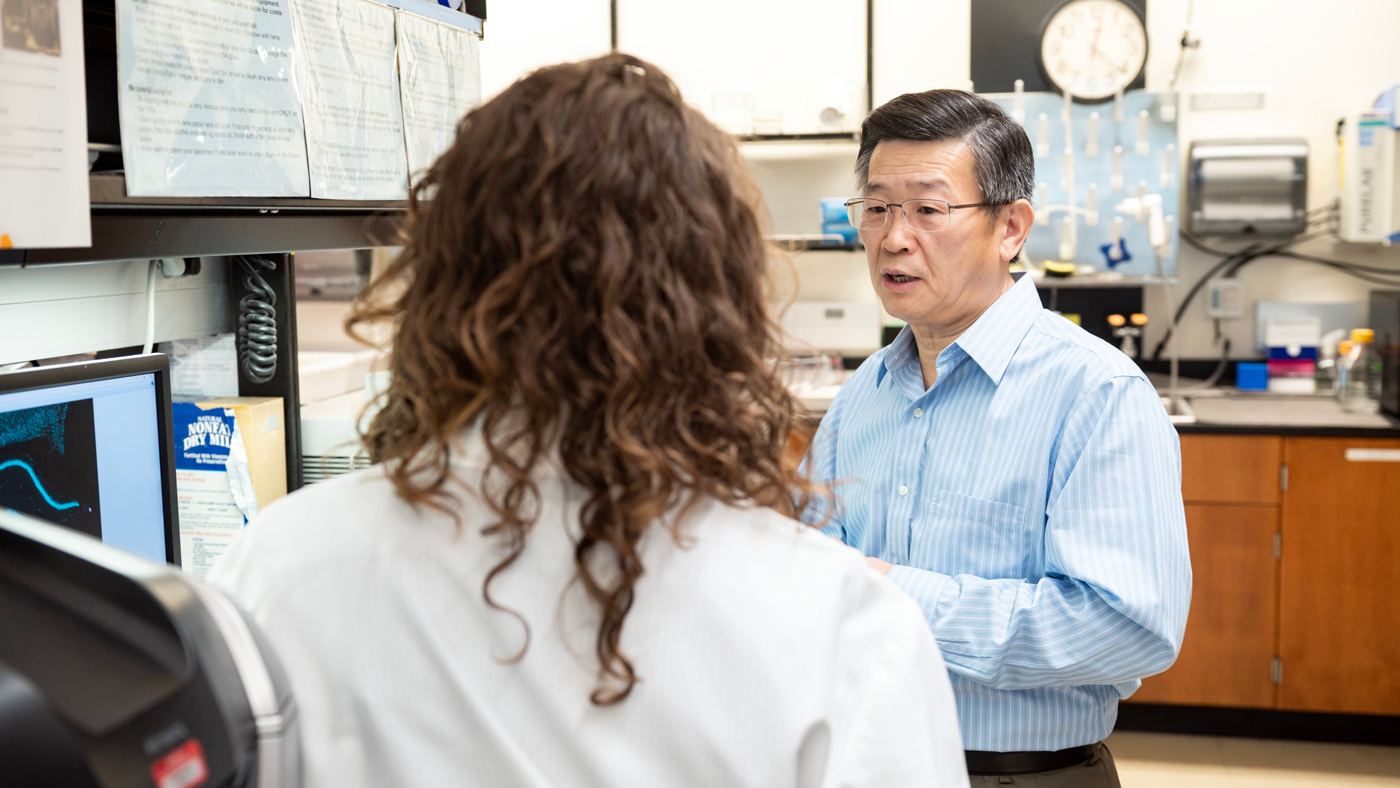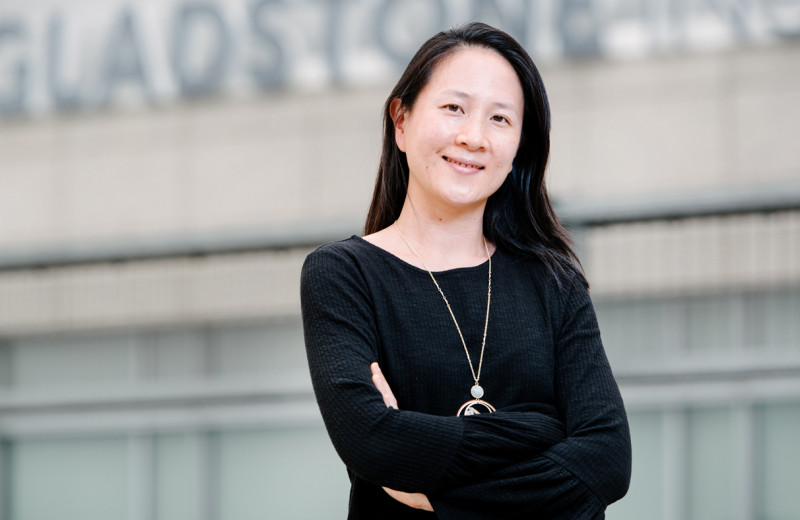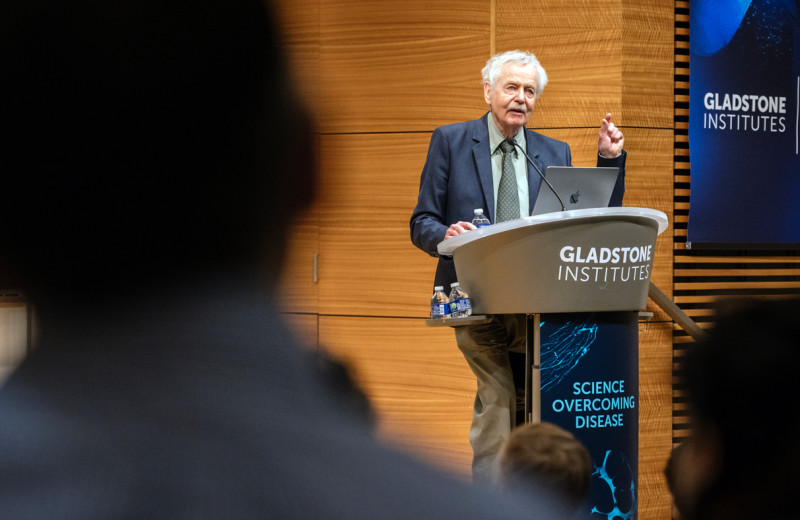Gladstone NOW: The Campaign Join Us on the Journey✕

Gladstone's Yadong Huang is the recipient of the 2024 Sobrato Prize in Neuroscience, an honor recognizing his many key discoveries on the genetic underpinnings of Alzheimer’s disease.
Gladstone Institutes has established a new scientific award, the Sobrato Prize in Neuroscience, to advance breakthroughs in brain research with high potential for patient impact—and announced it will present the inaugural prize to Yadong Huang, MD, PhD, a trailblazer in Alzheimer’s research.
In his nearly three decades at Gladstone, Huang has led a series of pioneering studies on the genetic underpinnings of Alzheimer’s disease, with discoveries that have opened multiple new avenues for drug development. He also founded and leads Gladstone’s Center for Translational Advancement, aimed at bringing treatments for unsolved diseases to patients more rapidly and affordably.
“Dr. Huang is a world-renowned expert on Alzheimer’s disease, and particularly on the role of the APOE4 gene in neurodegeneration and cognitive decline,” says Lennart Mucke, MD, director of the Gladstone Institute of Neurological Disease. “With an unwavering focus on patient impact, and numerous breakthroughs that are shaping future treatment approaches, his achievements are fully aligned with the mission of the Sobrato Prize.”
The prize, to be given annually to a Gladstone scientist, is made possible through a generous gift from Resonance Philanthropies, a donor-advised fund of Silicon Valley Community Foundation, funded by Sheri Sobrato. Honorees will receive $250,000 to advance brain disease-focused research with high translational impact.
"I’m confident that Gladstone’s team of outstanding researchers will leverage the new Sobrato Prize in Neuroscience to bring promising discoveries to patients and their families."
“Neuroscience research is among the most exciting and promising areas we’re funding today,” says Sobrato, a donor and impact investor in healthcare innovation. “I’m confident that Gladstone’s team of outstanding researchers will leverage the new Sobrato Prize in Neuroscience to bring promising discoveries to patients and their families.”
A secondary goal of the prize is to serve as a catalyst for raising greater awareness of—and funding for—Gladstone’s efforts to overcome disease with science, Sobrato says.
Bringing Breakthroughs to the Patient
Huang joined Gladstone in 1995, starting as a postdoctoral researcher in the lab of Robert Mahley, MD, PhD, president emeritus and founder of Gladstone Institutes. Over the years, the two became close collaborators, and both have dedicated their careers to understanding the cellular and molecular mechanisms of APOE4 in the brain.
Besides aging, APOE4 is the most impactful risk factor for Alzheimer’s disease—the most common neurodegenerative disorder and form of dementia in older adults. More than half of Alzheimer’s patients carry the APOE4 gene variant, making it the most significant genetic risk factor.
“Yadong is attacking this problem with multiple scientific approaches, from animal models to working with induced pluripotent stem cells (iPSCs) derived from Alzheimer’s patients with the APOE4 variant,” Mahley says. “Recently, he has advanced his efforts into clinical investigations, including a drug trial. Yadong has a very strong basic science approach but never loses sight of the translational aspect of his work.”

Yadong Huang is studying approaches for blocking the detrimental effects of the APOE4 gene, the most significant genetic risk factor for Alzheimer's disease.
Notably, Huang was the first to conclusively show that, in response to injury or stress, neurons first produce but then abnormally process APOE4, resulting in toxic fragments that contribute to Alzheimer’s. He also investigated a rare mutation of the APOE gene known as the Christchurch variant, which protects against Alzheimer’s.
Most importantly in regard to the Sobrato Prize in Neuroscience, Huang is studying approaches for blocking the detrimental effects of APOE4, including the development of a type of medicine called a protease inhibitor to prevent the production of toxic APOE4 fragments. He is also testing a drug called bumetanide, which is already FDA approved for other disease indications, in a clinical trial for Alzheimer’s disease.
A Prize to Propel Science
“The Sobrato Prize will make an enormous impact on moving important Alzheimer’s research closer to the finish line to benefit patients,” Huang says. “I’m honored to be named the first recipient of this award, and I thank Sheri Sobrato for her dedication to advancing critical science that can ultimately overcome disease.”
Philanthropy plays an integral role in empowering researchers to pursue high-risk, high-gain initiatives with potentially transformative translational potential, says Gladstone President Deepak Srivastava, MD.
“Our researchers often make important discoveries that we want to pursue immediately, not in two or three years,” Srivastava says. “This is where philanthropic support, such as Sheri Sobrato’s gift, makes a world of difference. It allows us to advance discoveries through the development pipeline to a point where we can attract additional funding from conventional agencies such as the National Institutes of Health or engage with a pharma partner to move them toward the clinic.”
For Media
Kelly Quigley
Director, Science Communications and Media Relations
415.734.2690
Email
About Gladstone Institutes
Gladstone Institutes is an independent, nonprofit life science research organization that uses visionary science and technology to overcome disease. Established in 1979, it is located in the epicenter of biomedical and technological innovation, in the Mission Bay neighborhood of San Francisco. Gladstone has created a research model that disrupts how science is done, funds big ideas, and attracts the brightest minds.
Support Discovery Science
Your gift to Gladstone will allow our researchers to pursue high-quality science, focus on disease, and train the next generation of scientific thought leaders.
Gladstone Scientist Nadia Roan Elected to American Academy of Microbiology
Gladstone Scientist Nadia Roan Elected to American Academy of Microbiology
Roan has made great strides in understanding how persistent viruses including HIV cause disease and how immunity to viruses shapes human health.
Awards News Release COVID-19 HIV/AIDS Infectious Disease Roan LabA Sculptor of Modern Regenerative Medicine
A Sculptor of Modern Regenerative Medicine
Among his myriad accomplishments, Rudolf Jaenisch—winner of the 2025 Ogawa-Yamanaka Stem Cell Prize—was the first to demonstrate the potential of induced pluripotent stem cells to treat disease.
Awards Ogawa Stem Cell Prize Profile Regenerative Medicine Stem Cells/iPSCsSix Gladstone Scientists Named Among World’s Most Highly Cited Researchers
Six Gladstone Scientists Named Among World’s Most Highly Cited Researchers
The featured scientists include global leaders in gene editing, data science, and immunology.
Awards News Release Corces Lab Doudna Lab Marson Lab Pollard Lab Ye Lab



